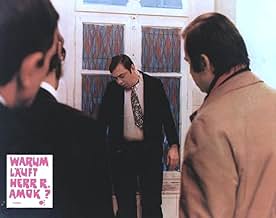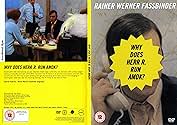CALIFICACIÓN DE IMDb
7.2/10
3 k
TU CALIFICACIÓN
- Premios
- 3 premios ganados y 2 nominaciones en total
Harry Baer
- Kollege im Büro
- (as Harry Bär)
Vinzenz Sterr
- Opa Raab
- (as Herr Sterr)
Maria Sterr
- Oma Raab
- (as Frau Sterr)
Carla Egerer
- Schallplattenverkäuferin
- (as Carla Aulaulu)
- Dirección
- Guionistas
- Todo el elenco y el equipo
- Producción, taquilla y más en IMDbPro
Opiniones destacadas
They don't make great low-budget films like this anymore. Fantastic performance by Kurt Raab, very moving, delicate, intense. You can feel the chill run down your spine when you watch him slowly degenerating. Fassbinder at his early best.
This is a terrific movie. I have seen the unsettling ending of it years ago. Today I was watching it from DVD. My recollection of the ending was so strong that I remembered all small details.
Highly sensitively Fassbinder gives insight into the life of a man that runs amok. Fassbinder succeeds in showing the motives of a crazy amok run.
If you don't know any of Fassbinders movies you must be aware that this is different than anything you know. Fassbinder portrays a man that lacks self-awareness and is poor of showing his emotions and who does not do more than he is asked for in his job. Herr R. is slow in mind and words. And yet, all that does not accumulate to his amok run. What does is hidden behind a surface that Fassbinder discloses one by one... 9 out of 10.
Highly sensitively Fassbinder gives insight into the life of a man that runs amok. Fassbinder succeeds in showing the motives of a crazy amok run.
If you don't know any of Fassbinders movies you must be aware that this is different than anything you know. Fassbinder portrays a man that lacks self-awareness and is poor of showing his emotions and who does not do more than he is asked for in his job. Herr R. is slow in mind and words. And yet, all that does not accumulate to his amok run. What does is hidden behind a surface that Fassbinder discloses one by one... 9 out of 10.
Why does Mr. R. run Amok? This question opens the films. Apparently. At first site Kurt Raab seems to lead quite a good life. He has a creative job, colleagues that accept him, at home there's a beautiful wife and a nice son. But thanks to Fassbinder and his way of filming, we can see closer at Herr R.
From the beginning he is simply not there, as Patrick Bateman would put it. When his colleagues make jokes, he walks with them, but not laughs with them. When his wife brings a friend, we see his narrow-mindedness. She is self-assured and liberal with no clue of what to do with her life, something Kurt is unable to understand. He needs order. He is order. He trys to have everything perfect in his sense, he works technically perfect like a machine, but lacks (human) ideas, or tries to cure his son's speech problems, but he always fails.
His system of perfection does not work. He does not work. And it keeps going on. You see Kurt in different allday situations, where he doesn't behave (all too) strange in a obvious way. But watch him more carefully and you see that he's empty. He holds down all emotions. In a banal situation, when he sees that his life is not perfect at all, and unable to adjust his system to the others like he always was, he tries to make his life perfect by eliminating all disturbing factors. He runs amok. And he does so as he always did: Emotionless.
What Fassbinder wants to show us, is what lies beneath the human fassade. We never know what a person really thinks or feel, because we're all masters of disguise and on the other hand unable or unwilling to find out (another) one's real feelings. And that can be dangerous.
From the beginning he is simply not there, as Patrick Bateman would put it. When his colleagues make jokes, he walks with them, but not laughs with them. When his wife brings a friend, we see his narrow-mindedness. She is self-assured and liberal with no clue of what to do with her life, something Kurt is unable to understand. He needs order. He is order. He trys to have everything perfect in his sense, he works technically perfect like a machine, but lacks (human) ideas, or tries to cure his son's speech problems, but he always fails.
His system of perfection does not work. He does not work. And it keeps going on. You see Kurt in different allday situations, where he doesn't behave (all too) strange in a obvious way. But watch him more carefully and you see that he's empty. He holds down all emotions. In a banal situation, when he sees that his life is not perfect at all, and unable to adjust his system to the others like he always was, he tries to make his life perfect by eliminating all disturbing factors. He runs amok. And he does so as he always did: Emotionless.
What Fassbinder wants to show us, is what lies beneath the human fassade. We never know what a person really thinks or feel, because we're all masters of disguise and on the other hand unable or unwilling to find out (another) one's real feelings. And that can be dangerous.
10hasosch
The idea that the human being is a Kosmos of his own, is know since the times of Romantics, at last. The even stronger theory according to which the human was been created after God has become a common feature of Christian religion. However, it has taken almost two thousand years before the philosopher Gotthard Gunther has stated that between an "I" and and "Though" there is exactly the same qualitative difference as between the human and God. On therefore has not to travel to the edges of transcendence in order to experience what a con-texture border means, it is sufficient to learn that insight into a Thou is excluded on principal reasons. This turns out to be important in all those cases where even close friends of a human become shocked and react in a way similar to: we would never have thought that he could do that.
Another problem, perhaps in a certain perspective even more delicate, is the border between a deed in thought and a deed in fact. Many people kill others in their wishes, dreams, they even say it without meaning it. On the other hand, some people would never say it, but then there is a moment when they do it. What is it that causes the transgression between thought and deed? R.W. Fassbinder presents a fully uncommented, non-condemnatory approach in "Warum Läuft Herr R. Amok?" (1970). Up to a certain degree, the absolute free speech which gives the illusion of everyday-conversations observed by a candid camera, has the form of a Brechtian "Lehrstück", however, there is no wagging finger to sense in this movie. The spectator is elevated into the position of the judge - if he really still thinks that the deed of Herr R. can be judged after having watched and understood the movie. The spectator even becomes a part of the movie, without him the communication scheme is incomplete. He is the receiver of a message from whom not even an answer is expected, but a revision in thinking on the basis of which has been presented to him. "A good movie is a movie that does not stop when people come out of the cinema, but continues in their heads", Fassbinder said once.
Another problem, perhaps in a certain perspective even more delicate, is the border between a deed in thought and a deed in fact. Many people kill others in their wishes, dreams, they even say it without meaning it. On the other hand, some people would never say it, but then there is a moment when they do it. What is it that causes the transgression between thought and deed? R.W. Fassbinder presents a fully uncommented, non-condemnatory approach in "Warum Läuft Herr R. Amok?" (1970). Up to a certain degree, the absolute free speech which gives the illusion of everyday-conversations observed by a candid camera, has the form of a Brechtian "Lehrstück", however, there is no wagging finger to sense in this movie. The spectator is elevated into the position of the judge - if he really still thinks that the deed of Herr R. can be judged after having watched and understood the movie. The spectator even becomes a part of the movie, without him the communication scheme is incomplete. He is the receiver of a message from whom not even an answer is expected, but a revision in thinking on the basis of which has been presented to him. "A good movie is a movie that does not stop when people come out of the cinema, but continues in their heads", Fassbinder said once.
Mr. R. (Kurt Raab) leads a convenient bourgeois life: he has a steady job with chances of promotion, a good-looking wife (Lilith Ungerer), a kid and many family friends. Still, a growing sense of disillusionment and alienation is gnawing Mr. R.'s mind... Is there anything he can do to cope with his mind-numbing life?
The film consists largely of lengthy conversations about the most mundane of things; work, vacations, the son's school, buying a romantic record in a music store... The whole picture is also presented exclusively with long takes and hand-held cameras. The improvised nature of the conversations further adds to the strictly realist documentary-like feel of the movie, as does the intentionally dull cinematography. With such undramatic direction, the only detail to suggest the advancement of Mr. R.'s emotional alienation is Kurt Raab's subtle performance: Mr. R. alternates between sullen observing and unrestrained blabbing, and when the camera occasionally focuses on his face instead of his chit-chatting friends, one can get a creepy feel of slowly escalating anxiety inside him. Lilith Ungerer as his wife also displays faint hints of similar emotions, but keeps them tightly hidden under her shell of excruciating normalcy.
When a film is titled like this one, some kind of dramatic ending or plot twist can be expected sooner or later. Here it only happens at the very end; until the last 10 minutes or so, the film is completely G-rated. The scene preceding the twist is the best one in the whole film and achieves a very distressing atmosphere, but still, the twist itself comes across as rather predictable and even lackluster. Perhaps it is just that modern audiences have become desensitized to such incidents, but more oomph would have been needed to justify the preceding 80 minutes of practically nothing, as Mr. R.'s boredom has also become ours by the end.
Even though there's not much to see besides the lead couple's performance, I have a taste for this type of uneventful, talky cinema. Ultimately Warum... was a curious novelty to me and kept me intrigued throughout, but I'm somewhat wary of recommending it to more casual film fans; something like Michael Haneke's 71 Fragments of a Chronology of Chance could be a more easily accessible take on the subject. Then again, if you know what to expect, Warum... may also be a rewarding experience in mundanity that many can surely identify with – you have to make up your own mind based on your tastes.
The film consists largely of lengthy conversations about the most mundane of things; work, vacations, the son's school, buying a romantic record in a music store... The whole picture is also presented exclusively with long takes and hand-held cameras. The improvised nature of the conversations further adds to the strictly realist documentary-like feel of the movie, as does the intentionally dull cinematography. With such undramatic direction, the only detail to suggest the advancement of Mr. R.'s emotional alienation is Kurt Raab's subtle performance: Mr. R. alternates between sullen observing and unrestrained blabbing, and when the camera occasionally focuses on his face instead of his chit-chatting friends, one can get a creepy feel of slowly escalating anxiety inside him. Lilith Ungerer as his wife also displays faint hints of similar emotions, but keeps them tightly hidden under her shell of excruciating normalcy.
When a film is titled like this one, some kind of dramatic ending or plot twist can be expected sooner or later. Here it only happens at the very end; until the last 10 minutes or so, the film is completely G-rated. The scene preceding the twist is the best one in the whole film and achieves a very distressing atmosphere, but still, the twist itself comes across as rather predictable and even lackluster. Perhaps it is just that modern audiences have become desensitized to such incidents, but more oomph would have been needed to justify the preceding 80 minutes of practically nothing, as Mr. R.'s boredom has also become ours by the end.
Even though there's not much to see besides the lead couple's performance, I have a taste for this type of uneventful, talky cinema. Ultimately Warum... was a curious novelty to me and kept me intrigued throughout, but I'm somewhat wary of recommending it to more casual film fans; something like Michael Haneke's 71 Fragments of a Chronology of Chance could be a more easily accessible take on the subject. Then again, if you know what to expect, Warum... may also be a rewarding experience in mundanity that many can surely identify with – you have to make up your own mind based on your tastes.
¿Sabías que…?
- TriviaIn 2003 on a interview for Village Voice Hanna Schygulla claimed that this film was completely done by director Michael Fengler, whereas purported co-director Rainer Werner Fassbinder had nothing to do with the actual film. She also claimed that film was almost completely improvised which wasn't Fassbinder's way to make movies. Fassbinder still is credited as director and writer on the actual film and on many official sources, including Fassbinder Foundation's website. This fact has been confirmed by Michael Fengler himself in the 2008 documentation Gegenschuss - Aufbruch der Filmemacher (2008). He reported, that Fassbinder was involved neither in writing nor in directing of the movie and has visited the movie set at most twice during shooting.
- ErroresWhen Herr R. leaves the doctor the camera team can be seen in the mirror on the wall.
- ConexionesFeatured in Sehnsucht nach Sodom (1989)
Selecciones populares
Inicia sesión para calificar y agrega a la lista de videos para obtener recomendaciones personalizadas
- How long is Why Does Herr R. Run Amok??Con tecnología de Alexa
Detalles
- Fecha de lanzamiento
- País de origen
- Idioma
- También se conoce como
- Why Does Herr R. Run Amok?
- Locaciones de filmación
- Müllerstraße 40, Múnich, Baviera, Alemania(bureau, Franz Maron, Architekt/Dipl. Ing.)
- Productoras
- Ver más créditos de la compañía en IMDbPro
Taquilla
- Presupuesto
- DEM 135,000 (estimado)
- Tiempo de ejecución
- 1h 28min(88 min)
- Mezcla de sonido
- Relación de aspecto
- 1.37 : 1
Contribuir a esta página
Sugiere una edición o agrega el contenido que falta





























